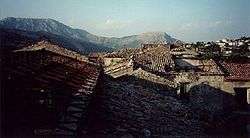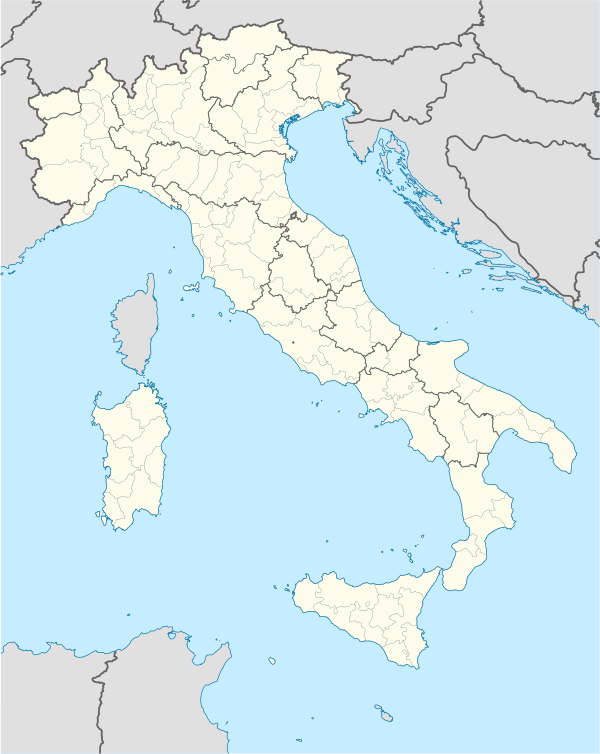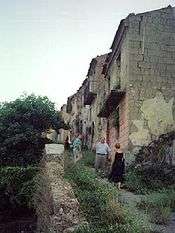Tocco Caudio
| Tocco Caudio | ||
|---|---|---|
| Comune | ||
| Comune di Tocco Caudio | ||
 | ||
| ||
 Tocco Caudio Location of Tocco Caudio in Italy | ||
| Coordinates: 41°8′N 14°38′E / 41.133°N 14.633°ECoordinates: 41°8′N 14°38′E / 41.133°N 14.633°E | ||
| Country | Italy | |
| Region | Campania | |
| Province / Metropolitan city | Benevento (BN) | |
| Frazioni | Acquasanta, Arco Marucci, Aspro, Baracca, Capitino, Cesche, Chiano, Ciesco Coppole, Cornito, Folletta, Friuni, La Pietra, La Riola, Le Martine, Lotola, Maione Lunario, Maione Stingio, Monticella, Pantaniello, Paodone, Pisciariello, Pretola, Ripoli, San Biagio, San Cosimo, San Gaudenzio, San Martino, Serra, Serratola, Sperara, Tasignano, Tocco Vecchio, Vigna, Vignali, Vocito | |
| Government | ||
| • Mayor | Antimo Papa | |
| Area | ||
| • Total | 27.2 km2 (10.5 sq mi) | |
| Elevation(Friuni) | 540 m (1,770 ft) | |
| Population (2005)[1] | ||
| • Total | 1,593 | |
| • Density | 59/km2 (150/sq mi) | |
| Demonym(s) | Tocchesi | |
| Time zone | CET (UTC+1) | |
| • Summer (DST) | CEST (UTC+2) | |
| Postal code | 82030 | |
| Dialing code | 0824 | |
| Patron saint | Saints Cosmas and Damian | |
| Saint day | 27 September | |
| Website | Official website | |
Tocco Caudio is the name of a village and comune in the province of Benevento, in the Campania region of southern Italy. The old town was abandoned after a series of earthquakes in 1980 and 1981.
Geography

As with many ancient towns in this mountainous region of southern Italy, Tocco Caudio was built on a promontory ridge. Tocco Caudio's ridge is fairly small and somewhat isolated. This arrangement made the town easily defensible, while having ready access to ridge-top roads along which a traveller would not need to cross any rivers. Also, as was typical with medieval development, the town is fairly compact with narrow streets.
In the 20th century the town layout, previously beneficial for the inhabitants, became a hindrance, as most of the core of Tocco Caudio was fairly inaccessible to automobiles. After going up a short, steep hill, one could drive a car only along one part of the main street. In other towns in the province, [Sant'Agata Dei Goti] being a good example, many houses and shops in the old town areas are now vacant due to their inconvenience. Many new homes tend to be built around the old town centers, as there is no need to stay within the old defensive walls.
History
In 1980 and 1981, earthquakes damaged much of the old historical habitat of Tocco Caudio. Rather than rebuild the historic town, the citizens were forced unwantedly to completely abandon it and resettle around the ridge. Today there are essentially two Tocco Caudios: an empty old town and a new town above it in a location called Friuni. The settlers there have never felt this in their town, and the loss of the historical town still lies in the memories of all, as if having lost the roots of the past, and having never planted the roots of the future and thus a population with no real identity.
Anything of value from the historic center was stolen throughout the following years of the earthquake, eyes that should have been vigil in the control of such mishaps went blind, ears deaf and tonques silent, the final result today is reality a[ghost town]. Most buildings are derelict; the church has lost its roof, although the brick belltower and the incredible stone spiral staircase to the bellfry are in excellent condition. Fortunately the local and provincial administration from the year 2000 have managed to receive government grants to rebuild the old church, mainly to resemble a sort of historical landmark, as if to erect and let emerge a flame over an empty graveyard, as sort of lighthouse, to evoke not danger, but a light of hope and goodwill to renew and start a new era for all.
Notable people
- Nicola Sala, composer and theoretist
- Carlo Coppolaro, composer and critic
- Carmen Valacchio, nuclear research
Notes and references
External links
![]() Media related to Tocco Caudio at Wikimedia Commons
Media related to Tocco Caudio at Wikimedia Commons
